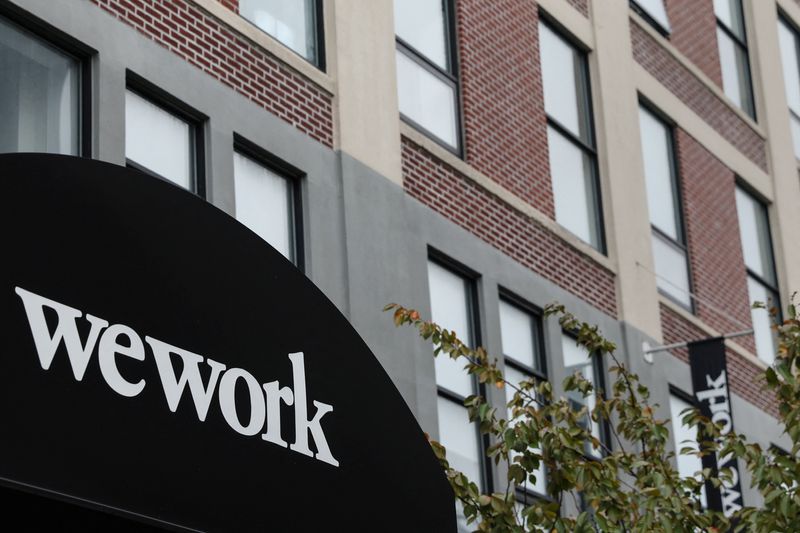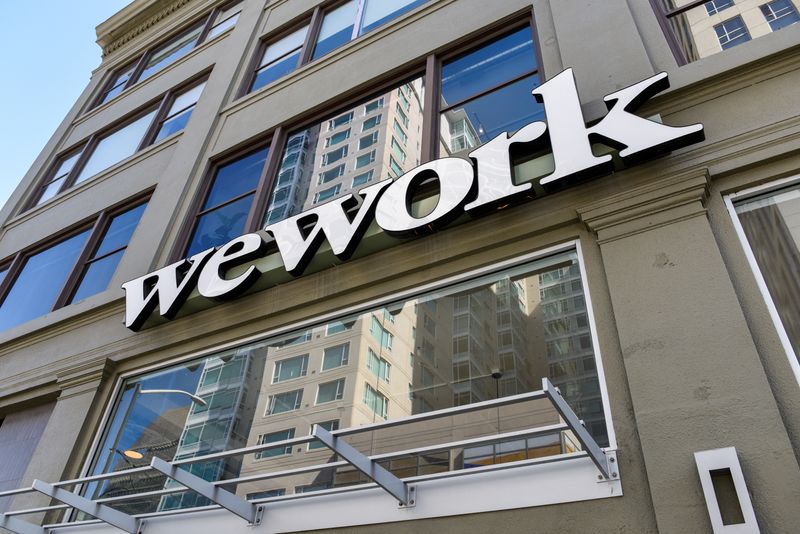(Reuters) -WeWork, the SoftBank (TYO:9984) Group-backed startup whose meteoric rise and fall reshaped the office sector globally, sought U.S. bankruptcy protection on Monday after its bets on companies using more of its office-sharing space soured.
The move represents an admission by SoftBank, the Japanese technology group that owns about 70% of WeWork and has invested billions of dollars in its turnaround, that the company cannot survive unless it renegotiates its pricey leases in bankruptcy.
A WeWork spokesperson said about 92% of the company's lenders had agreed to convert their secured debt into equity under a restructuring support agreement, wiping out about $3 billion of debt. SoftBank would retain an equity stake under the proposed restructuring, according to court documents.
The company, which also intends to file recognition proceedings in Canada, said it expected to have the financial liquidity to continue business normally and that its locations outside of the U.S. and Canada, as well as its franchisees around the world, were not affected by these proceedings.
WeWork had office space available at 777 locations worldwide as of the end of June.
SoftBank said it believed WeWork's restructuring support agreement was the appropriate action for the company to reorganize its business and emerge from Chapter 11 proceedings.
"SoftBank will continue to act in the best long-term interests of our investors," the Japanese company said in a statement.
WeWork shares have fallen about 98.5% so far this year.
Profitability has remained elusive, as WeWork grapples with expensive leases and corporate clients cancelling because of a trend toward employees working from home. Paying for space consumed 74% of WeWork's revenue in the second quarter of 2023, the last time it reported financial results.
In a filing with the New Jersey bankruptcy court, WeWork listed assets of $15.06 billion and liabilities of $18.66 billion as of June 30.
"WeWork could use provisions of the U.S. bankruptcy code to rid itself of onerous leases," law firm Cadwalader, Wickersham & Taft LLP said in a note to landlords on its website in August. Some landlords are bracing for a significant impact.
"As part of today's filing, WeWork is requesting the ability to reject the leases of certain locations, which are largely nonoperational, and all affected members have received advanced notice," the company said in a statement.
WeWork's bankruptcy court filings list 69 leases that the company intends to reject immediately, and the company said it is working to renegotiate leases with 400 landlords.
Under its founder Adam Neumann, WeWork grew to be the most valuable U.S. startup worth $47 billion. It attracted investments from blue-chip investors, including SoftBank and venture capital firm Benchmark, as well as the backing of major Wall Street Banks, including JPMorgan Chase (NYSE:JPM).
Neumann's pursuit of breakneck growth at the expense of profit, and revelations about his eccentric behavior, led to his ouster and the derailment of an initial public offering in 2019.
SoftBank doubled down on its investment in WeWork, and tapped real estate veteran Sandeep Mathrani as its CEO. In 2021, SoftBank cut a deal to take WeWork public through a merger with a blank-check acquisition company at an $8 billion valuation.
WeWork managed to amend 590 leases, saving about $12.7 billion in fixed lease payments. But this was not enough to compensate for the fallout from the COVID-19 pandemic, which kept office workers at home.
Many of its landlords, who were also feeling the squeeze, had little incentive to give WeWork a break on the terms of their leases.
While WeWork had some success in signing up large conglomerates as clients, many of its customers were startups and smaller businesses, which cut their spending as inflation soared and economic prospects soured.
Adding to WeWork's woes was competition from its own landlords. Commercial property companies that traditionally only entered into long-term rent agreements started offering short and flexible leases to cope with the downturn in the office sector.
Mathrani was succeeded as WeWork CEO this year by former investment banker and private equity executive David Tolley, who as chief executive of Intelsat helped the debt-stricken satellite communications provider emerge from bankruptcy in 2022.
WeWork engaged in debt restructurings, yet this was not enough to stave off its bankruptcy. The company last week secured a seven-day extension from its creditors on an interest payment to win more time to negotiate with them.

Shortly before WeWork filed for bankruptcy, Neumann said in a statement, "I believe that, with the right strategy and team, a reorganization will enable WeWork to emerge successfully."
Shares in SoftBank, which has largely written down its investment in WeWork over the years, closed up 0.3% on Tuesday in Tokyo, outperforming a 1.3% fall in the broader market.
